
As Stritch took her final bow, leaving Broadway, New York and the theatrical world forever changed, we are left with recollections of various performances — some of us with more than others — to remember her by, and a relatively small bunch of cast albums to keep on listening to. We remember the Broadway legend with a look back at this extensive column.
Read on…
| |
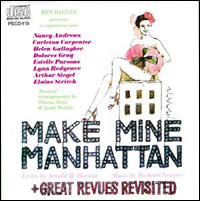 |
|
| Cover art |
Stritch studied the drama at Erwin Piscator's Dramatic Workshop, but first attracted notice in a shoestring revue called Angels in the Wings. The show was a surprise success, due in part to the performances of the now long-forgotten Paul and Grace Hartman. Two Qs: Who won the first Tony Award for Best Actor in a Musical? Who won the first Tony Award for Best Actress in a Musical? A: Paul and Grace Hartman, for Angels in the Wings.
Stritch was given one song, "Civilization" by Bob Hilliard and Carl Sigman, about three educated savages in a bamboo tree who sing "Bongo bongo bongo I don't wanna leave the Congo." Pure nonsense, but Stritch sold it. The show went unrecorded, but 30 years later Stritch sang it on Ben Bagley's "Make Mine Manhattan + Great Revues Revisited" [Painted Smiles]. If you can't find that — and it is rather difficult to find nowadays — Stritch also performs it on the cast album of Elaine Stritch At Liberty [DRG] with seemingly all the energy she possessed 55 years earlier. It isn't quite as pert as the 1977 recording, though, so I prefer the earlier one.
| |
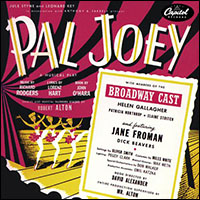 |
|
| Cover art |
Stritch graduated to a steady job in 1950 as standby to Ethel Merman in the original Broadway company of Irving Berlin's Call Me Madam. Which meant not performing the Irving Berlin score, as Merman was steady as a rock. (Sniffles? Flu? Severe illness? Merman did not believe in calling in sick.) Stritch — who was 17 years younger than Merman — did get to play the role for 50 weeks when she took out the national tour.
Just before the tour, she had a featured role in Jule Styne's 1952 revival of Rodgers & Hart's Pal Joey. She played Melba, the newspaper reporter who comes on for a scene and a song. "Zip" — relating a supposed interview with ecdysiast Gypsy Rose Lee — has always been one of the highlights of the show. Stritch's rendition is, not surprisingly, raucous and borders on strip tease. You can find it on the 1952 cast album of Pal Joey [Capitol].
| |
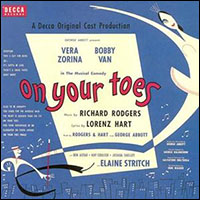 |
|
| Cover art |
All right, "You Took Advantage of Me" is not from On Your Toes. But the highly successful 1952 Pal Joey revival spawned a lukewarm 1954 revival of the 1936 Rodgers & Hart hit. Vera Zorina, who had played leading lady Vera Barnova in the 1937 London production and the 1939 film version, here reprised her role. (OK, let's get this right: Tamara Geva, who created the role on Broadway, was the first wife of On Your Toes choreographer George Balanchine. Zorina, after London, became the third Mrs. B. They divorced in 1946 — when Zorina married record producer Goddard Lieberson — but this didn't stop her from working with Balanchine again on the 1954 revival.)
Zorina starred opposite Bobby Van, from Hollywood, who sure didn't measure up to Ray Bolger. But the entire enterprise fell flat. George Abbott (who produced and directed the revival) hired Stritch as what must have seemed like some kind of built-in reminder of the good times of Pal Joey, but it didn't help. Elaine played Peggy Porterfield, the comedy relief. They — presumably Rodgers, who was very much in evidence — decided to interpolate "You Took Advantage of Me," a standard from the 1928 R & H musical Present Arms! Stritch's rendition is, surprisingly, raucous and borders on strip tease (in a dive). Not much help, as the show closed in eight weeks. But the track on the 1954 cast album — with a wild vocal arrangement by Portia Nelson and a jazz-infused orchestration by Red Ginzler — gives us a good audio snapshot of Stritch at 30.
| |
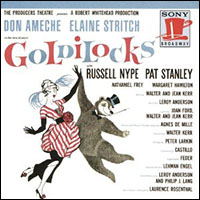 |
|
| Cover art |
Stritch had what was arguably her finest role — as Grace, the owner of the diner — in William Inge's 1955 drama, Bus Stop. But that wasn't a musical. She got her first chance at stardom in 1958 with Goldilocks, with music by Leroy Anderson and book and lyrics by Walter & Jean Kerr. Walter, who was better known as a theatre critic for the Herald Tribune, also directed; Agnes de Mille choreographed. Goldilocks had several charms — including a sometimes sprightly score and winning performances from the secondary couple, Pat Stanley and Russell Nype (both of whom won themselves Tonys in the process). But the show, a supposed spoof of the silent film era, was done in by the material. Struggling to salvage the show, they fired one of the two stars during the tryout — not Stritch, the other one. But to no avail; the show died after 20 weeks. Even so, the original cast album [Sony Broadway] gives us two lovely servings of Elaine-as-leading-lady.
"Who's Been Sitting in My Chair?" draws on the old Goldilocks tale — hence the show's title — and included a dance for the leading lady and a stuffed bear. "I Never Know When," on the other hand, is a dead-of-the-night torch song, and one which deserves more of a life than it has had. Stritch is smoky and wistful and immensely winning. Before you leave Goldilocks, if you happen to stop by to hear these two tracks, make sure you listen to the perky overture by Phil Lang (with sections by Anderson). And the big dance number "The Pussy Foot," which is so delectable that it won Ms. Stanley her Tony.
| |
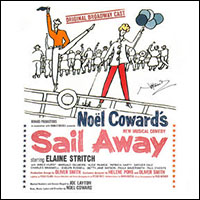 |
|
| Cover art |
Opportunity knocks twice, they say; Stritch, at least, was to have two original musical comedies written around her. (If either had been successful, there would no doubt have been more.) The knockee in this case was Noël Coward, no less, with a vapid shipboard tale called Sail Away. Struggling to salvage the show, they fired one of the two stars during the tryout — not Stritch, the other one. But to no avail; the show died after 21 weeks. The original cast album [DRG] is less felicitous than Goldilocks, but it is good for occasional listening. For our purposes, I select two tracks — Stritch's opening number and her closing number. Neither are especially good songs. "Come to Me" shows Stritch thoroughly in charge, at least. Her character, a cruise ship hostess, is assuring passengers that she will see them through no matter how rocky the cruise becomes. The way she sings it, though, suggests that she is going to personally entertain the theatergoers; no matter if the writer and director (i.e., Coward and Coward) are thoroughly stranded. And listen to what she does with "Why Do the Wrong People Travel?" The song is a one-track list song which only intermittently hits. No matter; Stritch sings it like it is some Irving Berlin 11-o'clock number, and earns the built-in encore.
What of the romantic ballad, "Something Very Strange (Is Happening to Me)"?, people familiar with the cast album might ask. I'm afraid I've never found it effective. Stritch sings it well enough, but she doesn't sound real to me; perhaps because the song was written for another character altogether. While you're listening, though, you might want to stop for a non-Stritch song, "Call Me." This is Grover Dale (who was to become a choreographer) and Patricia Harty, as the young lovers, with a delightful Irv Kostal arrangement that makes Coward sound almost contemporary. Speaking of Kostal, I would suggest that you simply avoid the 1962 original London cast album. Producer Harold Fielding refused, at the last minute, to pay Kostal for the use of his New York charts; Kostal, thus, refused to allow Fielding to use them. Wally Stott — who later became Emmy-winning arranger Angela Morley — rushed through new orchestrations, but they have none of the sparkle of the originals.
The failure of Goldilocks and Sail Away more or less scuttled Stritch's chances at musical comedy stardom. She returned to Broadway in 1963 with Who's Afraid of Virginia Woolf? Uta Hagen only played six performances a week — one a day was more than enough — so the producers hired separate actors to play Martha and George at the matinees. Stritch came in when the original matinee Martha left. It is said that she was very good, and I would expect she was. She soon left for a new play, which folded on the road. From 1963 through the rest of the century, she would return to Broadway only thrice.
*
"The Ladies Who Lunch" from Company, 1970
Stephen Sondheim's Company, in a way, started the second stage of Stritch's long career. Joanne — the oldest and wryest of Bobby's good and crazy friends — was an ensemble role. You could call her the most important of the featured players, by virtue of her material, but she is truly one of 11. She does have the juiciest scene and the juiciest song. People have been singing "The Ladies Who Lunch" since it poured forth from Sondheim's piano bench in 1970, sure; but it really does belong to Elaine. Just listen.
Stritch went to London with Company in 1972 and stayed, mostly, for the rest of the decade. The visit was extended by the U.K. sitcom "Two's Company," the other one of the two being Donald Sinden. This began in 1975 and ran for four seasons; it is available on video from Acorn Media, and the two stars — as an American mystery writer living in London and her long-suffering butler — make things quite enjoyable. While we are dealing with Stritch's life on cast albums, let us asterisk the theme song "Two's Company" (music by Denis King, lyrics by Sammy Cahn). It is prime Stritch, at the very top of her game.
| |
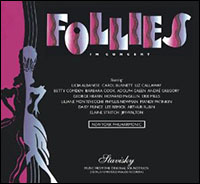 |
|
| Cover art |
No, Stritch didn't appear in Stephen Sondheim and James Goldman's Follies; there was no role that fit. Hattie Walker, the character who sings "Broadway Baby," otherwise merely steps in and out of the proceedings. Not a profitable way of spending the evening for our Elaine. But when Follies was performed in concert at Avery Fisher Hall in 1985 for two performances with as close to an all-star cast as you're likely to find around Broadway, Stritch fit right in. Yes, Ethel Shutta, an authentic Ziegfeld star who originated the role in 1971 at the age of 74 — and who died in 1976 — was incomparable in the song. But Stritch does herself proud on the recorded Follies in Concert [Masterworks Broadway].
A Broadway baby, perhaps; but Stritch's personal vagaries (fueled by alcohol, as she has so readily discussed) kept her in limbo and away from Broadway — for over 20 years, from her final performance in Company until Hal Prince (producer/director of Company) gave her another chance in his 1994 revival of Show Boat. Stritch acquitted herself well, following up with a smashingly good dramatic performance in the 1996 Lincoln Center Theater revival of Edward Albee's A Delicate Balance.
| |
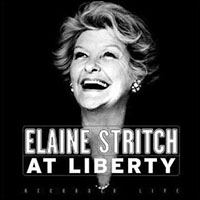 |
|
| Cover art |
And then it was that Stritch in 2001, having passed her 75th birthday, devised her one-woman show. Working with writer John Lahr and director George C. Wolfe, she managed to come up with what had evaded her since Truman was in office: a sturdy star vehicle tailored to her distinctive set of talents. Elaine Stritch At Liberty [DRG] was beyond superb, and Stritch herself was a marvel in it. What's more, it was a smashing big hit — for once, Elaine Stritch actually sold tickets — both at the Public Theater, where it started, and the Neil Simon, where it ended. Not ended, really; Stritch continued to use the material for the rest of her career, and I suspect she will continue to do so after her retreat to Michigan.
Irving Berlin's show-biz anthem is not a prototypical Stritch song, of course. But this track — which served as the opening number for Elaine's shindig — perfectly illustrates the magic of Elaine Stritch At Liberty. She doesn't just sing the song; she mixes in anything and everything that comes to mind in impromptu fashion. Impromptu but with every pause and aside no doubt carefully contrived and modulated. "The costumes, the scenery, the makeup, the props"; eight words, it takes Stritch 75 full seconds to get through them. Literally. This is the essence of Stritch, finally unsheathed after all those years. Also of note is her gutsy rendition of Sondheim's "I'm Still Here." The track starts with 90 seconds of laughter and patter, but the performance is tops — although it is more Elaine Stritch than Carlotta Campion (i.e.: the character who sings it).
And so we have it. We've been watching Stritch through good times and bum times; I first saw her in 1967 as a perfect Ruth Sherwood in a City Center revival of Wonderful Town. Now she is gone forever, but that voice, and that sense of delivery, will long remain with us.
(Steven Suskin is author of "Show Tunes," "The Sound of Broadway Music: A Book of Orchestrators and Orchestrations," "Second Act Trouble," the "Broadway Yearbook" series and the "Opening Night on Broadway" books. He also pens Playbill.com's Book Shelf and DVD Shelf columns. He can be reached at [email protected].)
Visit PlaybillStore.com to view theatre-related recordings for sale.









